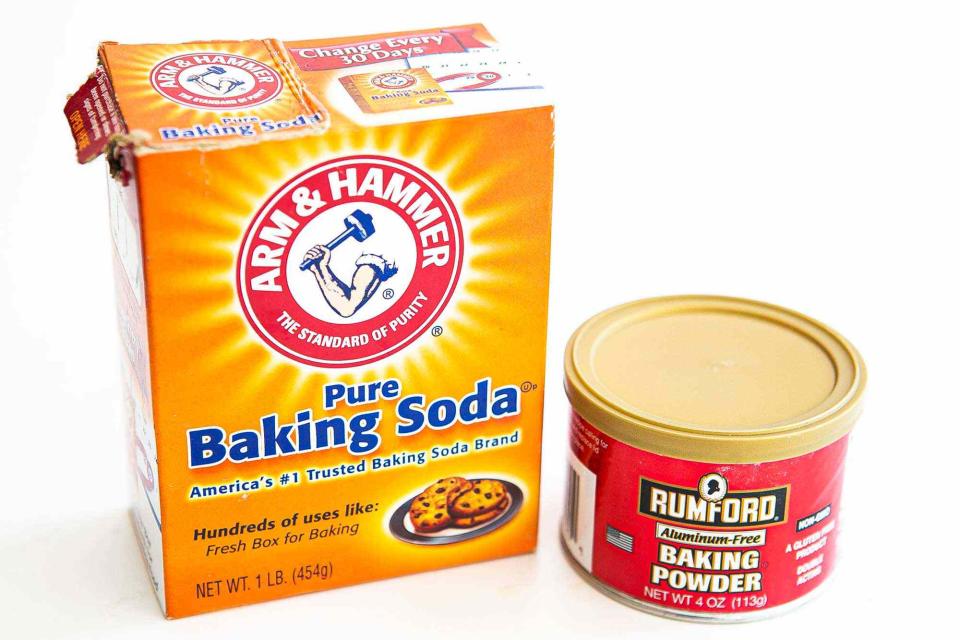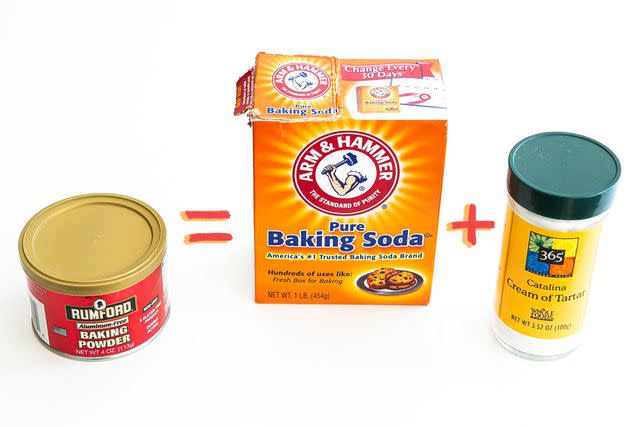Is Baking Powder the Same as Baking Soda?
What's the difference between baking soda and baking powder? Here's how to substitute one for the other, how to test if your baking soda and powder are still good, and how to make homemade baking powder.

Almost every cook has faced this scenario: You're following a recipe that requires baking powder but you only have baking soda. What do you do? Can you substitute?
Or this one: You haven't baked for a while, and you make a favorite biscuit and use baking powder, only to find that your biscuits bake up flat as hockey pucks. What went wrong?
Baking Soda vs Baking Powder
Baking soda (a.k.a. sodium bicarbonate) and baking powder are both leaveners used in baking, but they are chemically different.
The easiest way to explain it is that baking soda is a base—it's alkaline. Remember those experiments we did as kids, adding vinegar to baking soda to watch the eruption of bubbles?
When you mix a base (baking soda) with an acid (vinegar) you get a reaction (bubbles).
So if you encounter a baking recipe that uses baking soda, often that recipe will have an acidic element as well, such as vinegar, lemon juice, buttermilk, molasses, or yogurt. When the two come into contact, bubbles of carbon dioxide are formed, creating the leavening in your dough or batter.
Baking soda will create leavening on its own when it is heated (try pouring boiling water over baking soda in a sink to help unclog a drain, it will bubble up!), but unless it is balanced with an acidic ingredient, the resulting taste may be metallic.
Baking powder is a mixture of baking soda and a dry acid, such as cream of tartar, and perhaps some cornstarch to help keep the two separate and dry. Since baking powder contains an acid already, it doesn't need another acidic ingredient in order get a reaction and you don't have to worry quite so much about a metallic aftertaste.
What is Double Acting Baking Powder?
Most baking powders on the market are "double acting," meaning that some leavening occurs the minute the baking powder gets wet, and the rest of the leavening occurs when it is heated. This gives baked goods a double boost, and it also means that you don't have to worry quite so much about getting them to the oven right away, as you do with single-acting baking powder.
How Long Do Baking Soda and Baking Powder Last?
It depends on storage conditions. Baking soda can last quite a long time if stored sealed in a cool, dry space.
Baking powder, however, is problematic. It can last 3 months, or it can last a year. If you are in a humid environment, once opened, baking powder might not last more than a few months.
Having ruined a dish or two with old baking powder, I try to buy small cans, and I write the purchase date on the side of the can, so I know how old it is.
How to Test if Your Baking Soda or Baking Powder is Still Good
The easiest way to test baking soda to see if it is still good for leavening is to put some in a small bowl and add a little vinegar to it. (Make your own baking soda volcano!) If it bubbles up, it's still good.
The easiest way to test baking powder to see if it still works is to put some in a small bowl and add some water to it. If it foams up, it's still good.
How to Substitute Baking Powder for Baking Soda
If you have a baking recipe that calls for baking soda, and you only have baking powder, you may be able to substitute, but you will need 2 or 3 times as much baking powder for the same amount of baking soda to get the same amount of leavening power, and you may end up with something that's a little bitter tasting, depending on the recipe.
Tip
If a recipe calls for 1 teaspoon of baking soda, you'll want to substitute with 2 to 3 teaspoons of baking powder. Just make sure your baking powder is still effective and not past its use-by date.
How to Substitute Baking Soda for Baking Powder
If you have a baking recipe that calls for baking powder and you only have baking soda, you may be able to substitute if you increase the amount of acidic ingredients in the recipe to offset the baking soda. You'll also need much less baking soda as it is 3 times as powerful as baking powder. You'll also need about 1 teaspoon of vinegar or lemon juice for every 1/2 teaspoon of baking soda.
Tip
If a recipe calls for a tablespoon of baking powder, you'll want to substitute with a teaspoon of baking soda. You'll also want to add 2 teaspoons of vinegar or lemon juice to your batter.

How to Make Homemade Baking Powder
If you have baking soda and cream of tartar, you can also easily make your own baking powder.
If you live in a humid environment, or don't bake that often, it might be easiest to make your own baking powder when you need it. Packaged baking powder loses its effectiveness within 3 to 6 months, especially if it's exposed to air or humidity.
To make your own homemade baking powder, you'll need cream of tartar—a dry acid in powder form (no idea why it is called "cream")—and baking soda. If you intend to store homemade baking powder, you'll also want to add some cornstarch to keep it from clumping.
Read More: What is Cream of Tartar?
Baking soda is much stronger than baking powder. To make baking powder, mix one part baking soda and two parts cream of tartar. So, if you recipe calls for 1 tablespoon of baking powder, use 1 teaspoon of baking soda, mixed in with 2 teaspoons of cream of tartar. If you are storing the homemade baking powder instead of using it right away, stir in 1 teaspoon of cornstarch.
Homemade baking powder is not double acting, and will start to react as soon as it gets wet, so work quickly and don't let your batter sit around!
Read the original article on Simply Recipes.

